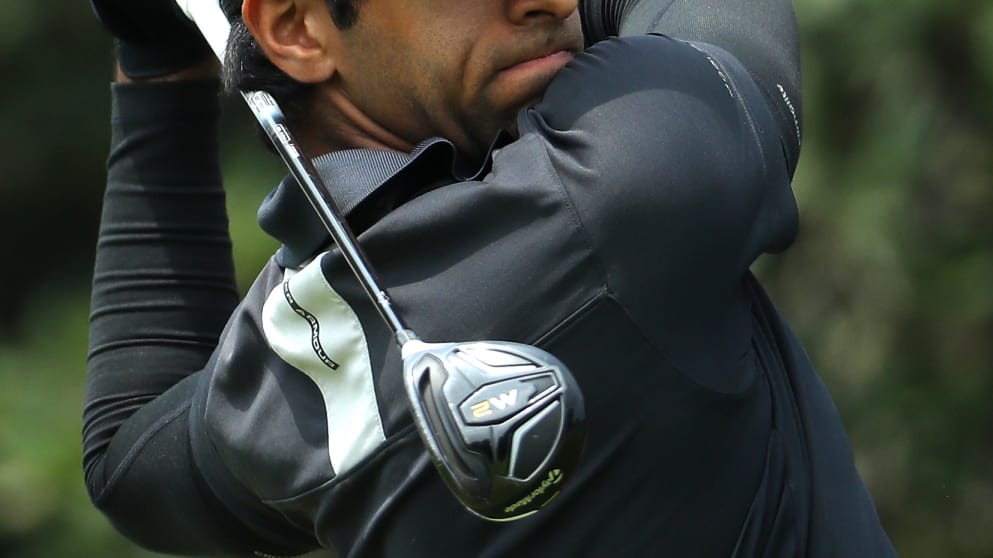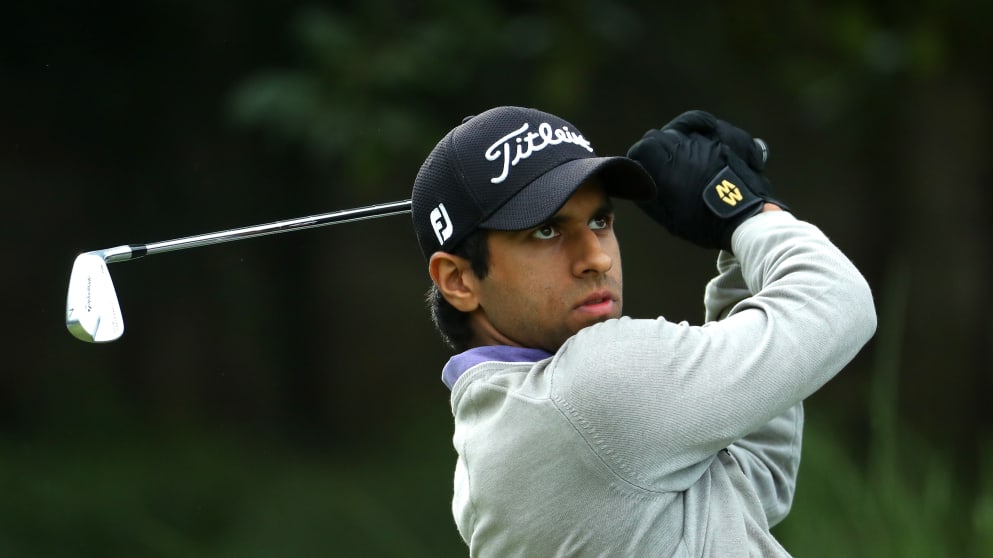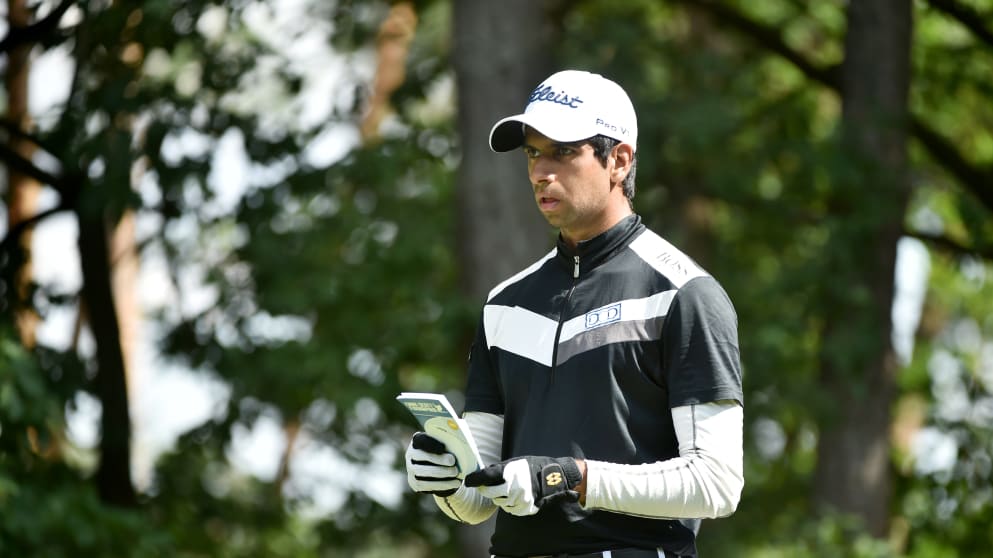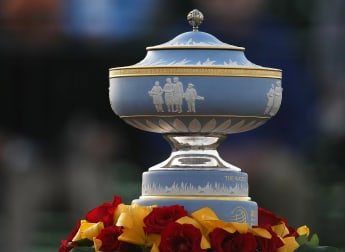Aaron Rai, one of the emerging stars on last year’s Road to Oman, caught the eye for his exceptional performances on the course as a European Challenge Tour rookie – as well as for, unusually, wearing two gloves to play golf in.

Well now, the gloves are off. Ahead of the season-opening Barclays Kenya Open at Nairobi’s Muthaiga Golf Club, the 22 year old Englishman opened up about his breakthrough 2016, his hopes for the coming season, his mother’s Kenyan heritage and, of course, his unique choice of hand wear:
The last time we saw you was at the Grand Final at the end of a phenomenal first year on the Challenge Tour. You ultimately finished 18th on the Road to Oman, only about 2,500 points away from European Tour graduation. How were your emotions that week, knowing how close you were to getting one of those European Tour cards, and on reflection how proud are you of what you achieved last year?
It wasn’t too bad even immediately afterwards. Like you said, it was a good year, and obviously the week in Oman would either have made the year result-wise in terms of graduating to the European Tour, but it shouldn’t have taken anything away from the year either.
Even immediately after Oman, it was a little bit disappointing of course, but it still felt like it was a pretty good year so I was definitely pleased overall.

Was it a big step up from what you’d done previously, on the EuroPro Tour or as an amateur, and did you expect to make the transition to the very top of the Challenge Tour so quickly and easily?
I didn’t really have too many expectations going into last year. I just tried to apply myself the way I had done on the EuroPro Tour and tried to learn along the way in terms of playing different grasses and different courses.
In terms of adapting to it all pretty quickly, I was very pleased with how it went last year. I tried not to have too many expectations in terms of finishing in the top 15 or trying to keep my card, I just tried to play each event as it came and see what happened.
Is there a big difference between the EuroPro Tour and the Challenge Tour?
In terms of standard, I think there’s possibly just a little more depth, but whether you play EuroPro or Challenge Tour, you have to play really well for three or four days respectively, so in that respect it doesn’t change.
In terms of the travel and the lifestyle, EuroPro is mainly around the UK so it’s pretty easy to get around, and you also have the weekends at home so you’re always coming back, whereas out here you can have a few weeks on the road where you don’t go back home, so in that sense it’s a little bit different and takes a bit of adapting to. But just adding to the experience and going out there and doing it puts you in a better position ahead of the next time.

You seemed to be near the top of the leaderboard every week last season, and came close to winning several times. How did those near misses affect you, and what have you learned from them going into this year?
First and foremost, when you put yourself in that position on a few occasions it shows that you’re doing a few things right, so it’s definitely about just trying to continue in that same vein.
In terms of not quite getting over the line and maybe struggling a little bit on the Saturday and Sunday, I think that’s just one of those where you have to look at yourself and reflect on what happened and hopefully moving forward you can learn from it.
You’d like to think you’re in a better position as a result of those experiences but you can never say for sure how it’s going to go and what’s going to happen. All you can do is learn from them and try to give yourself a slightly better chance than you have in the past.
You stood out from a very early stage last season, for a number of reasons. You were a new face on the tour, and very quickly started to do well. But also you seemed to be happy to be slightly isolated, practising on your own. Was that a conscious thing, or was it a bit of inevitable adjustment to your new surroundings?
Funnily enough, that’s something we’ve just always done. I spent a lot of time with my dad growing up, it was often just me and him on a golf course both for practice and also in the lead up to tournaments, so I think just playing amateur golf, playing EuroPro, playing Challenge Tour, I’ve just kept the same kind of approach – I try to do my own thing and just prepare as well as I can.
On the subject of your family, your parents were out at several events throughout last year, and it was great to see how supportive they are. How important is their support to you?
It’s very important. To have that support from your parents, your family, it goes a long way, and it’s always a team effort – of course it’s just you out there, but there are a lot of people behind you, and my family is a big part of that.
Actually my mum is here this week as well – she was born in Kenya and lived here for 14 years. She left here in 1970 to come to England and she hasn’t been back until now! It’s nice to have her here this week, and for her to come back to her home.
She’s not Kenyan – her mum was born in India and came over to Kenya in the late 1940s I think, so my mum was born here but is of Indian origin.
You also caught the eye for your attire. Can I ask you about the sleeves? And the two gloves? Is it style or superstition? Or more practical than that?
Yeah it’s a lot more practical than that I’m afraid! The two gloves is just something I’ve worn for a very long time, probably since I was about eight years old, and if I was to wear one glove I don’t think I would have the grip on my hands to do so any more.
The reason for the sleeves is just the heat really, it helps keep me cooler as we go to some warm places.

Do you find it easy to switch off away from the course? Golf can be quite an all-encompassing game, a very mental game, so is it easy to escape that?
I think with golf in general, it reflects your traits within your personality. So for some people I think it’s easy for them to turn it on and off when you’re on the course and off it, but I think it’s about developing as a person off the golf course that in turn grows into your performance on the golf course.
In terms of switching on and off, I like to think I’m pretty chilled out on the golf course and I’m pretty similar off it – I try not to turn on and off, just stay on a pretty similar level throughout.
Looking ahead to this year, how have your pre-season preparations been going?
They’ve been going well. It was nice to have a break towards the end of last year and spend Christmas and New Year at home. Then in January I played a couple of events on the Algarve Tour, which was pretty good, and then fortunately last month I got a couple of starts on the European Tour at the ISPS HANDA World Super 6 Perth and then the Joburg Open, so my preparation has been good – it’s been good to play a little bit of golf but also have the balance of some time off as well.
You had your best ever result with that top ten at the Joburg Open. How much confidence did you take from performing that well at that level?
I think the level on the Challenge Tour is very competitive, there are so many guys who are very good golfers week in, week out, so you have to perform very well every week, and in that respect I think the Challenge Tour is pretty close to the European Tour in terms of standard.
But it was very nice to have a really good result that week. Although you believe you’re good enough beforehand, it’s nice to actually have the result to back that up, so it was a very good week overall.

And now, back on African soil, how are you feeling ahead of this week’s Barclays Kenya Open?
I’m looking forward to it. This is my second Kenya Open, I played here last year, so it’s nice to have a little bit more experience and have a feel for the grass, a feel for the heat, and know what to expect a little bit more, so I’m feeling good ahead of this week.
What will be the keys to doing well around Muthaiga?
It’s not an overly long course and it’s pretty firm, and it’s quite tight in places so I think hitting it well off the tee and keeping yourself in a good position, just being solid throughout the week and giving yourself chances, I think those are the main keys to doing well around here.
And finally, what are your goals for this season?
I’ve not really set any targets. I’m just going to try to take it week by week and try to prepare well, give myself the best chance at every tournament and see what happens.
Obviously going two places better than last year and graduating would be nice, but the end of the season is a very long way away so we’ll just have to take it one week at a time and see what happens.
I have an idea of roughly my schedule but it’s still pretty flexible at the moment. It definitely helps this year on the Challenge Tour to know exactly what I can play, having a category that will get me into everything, and the Challenge Tour will definitely be a priority this year – knowing some of the countries now, the courses, and being able to plan ahead is great.




